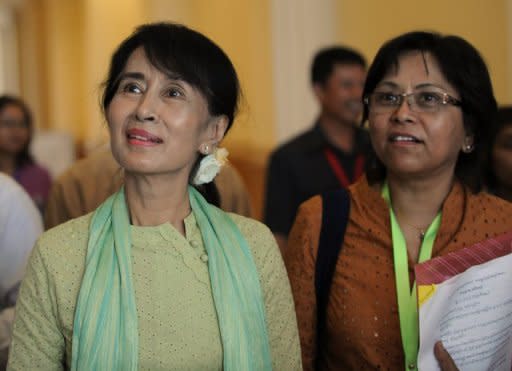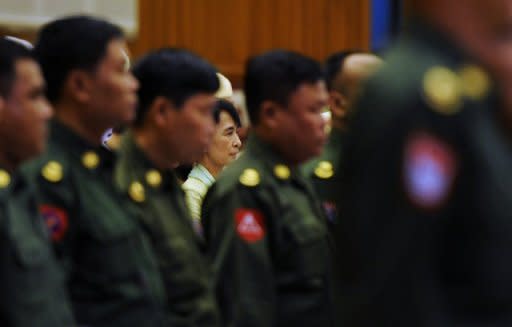Suu Kyi's fame risks eclipsing new Myanmar stars
Aung San Suu Kyi's iconic allure has helped train the eyes of the world on Myanmar's democracy struggle, but some experts say her star appeal could thwart the rise of a new generation of leaders. The Nobel laureate, who has come to personify Myanmar's efforts to shrug off the yoke of decades of dictatorship, made her parliamentary debut on Monday in the latest chapter in her transformation from renowned political prisoner to MP. The 67-year-old has suggested she is willing to accept the mantle of president if, as expected, her party wins 2015 elections seen as the apex of recent reforms. But many are already asking who could follow in the footsteps of "The Lady". Western governments showed great interest in finding "political alternatives" to Suu Kyi when she was under house arrest before controversial November 2010 elections, said Renaud Egreteau, a Myanmar expert at the University Hong Kong. "Two years later, idolatry is back. Alternatives within the democratic opposition are again marginalised." Suu Kyi has said she has tried shunning the "icon" label since being propelled into Myanmar's political scene during a failed student uprising against the junta in 1988. But as the daughter of independence hero Aung San she has failed to escape cult status both at home and abroad. Some observers argue that a simplistic portrayal of Myanmar's politics as a battle between a charismatic woman and a cabal of murderous generals could undercut efforts to bring a new generation of democracy leaders to the fore. That narrative is particularly strong in the West, which has focused on her entrance into mainstream politics as a benchmark for easing strict sanctions. Her reception as a virtual head of state in Europe last month confirmed her unique place in the imaginations of people who might otherwise struggle to find her long-isolated homeland on a map. But lavish welcomes during her first major trip abroad in nearly a quarter century have also threatened to strain relations with President Thein Sein, largely acknowledged as the architect of sweeping political changes since he took the helm of a quasi-civilian government last year. "It is a bit unusual for somebody who is the leader of the opposition to receive such high level treatment," said Trevor Wilson, former Australian Ambassador to the country. "I don't think the international community fully appreciates the role of other parties and political actors in Myanmar," he said, describing Suu Kyi's trip to Europe as "not part of the real world". While the NLD has become the largest opposition group, parliament remains dominated by the military and army-backed ruling party and with only 43 seats, Suu Kyi's party is likely to have to form alliances to affect legislation. But smaller democracy parties -- many of which have been eagerly pushing the country's reforms from inside the legislature for over a year -- have felt shunned by the NLD juggernaut. Among them is former NLD founding member Khin Maung Swe, whose relations with Suu Kyi soured dramatically when he disagreed with her party's decision not to contest the 2010 election over rules seemed designed to exclude her. He split from the NLD to form the National Democratic Force, which now has eight seats. Although Suu Kyi herself finally agreed to run in April's by-elections, she has not talked to him ever since. "We have done what we thought we should do, for the benefit of the people," said the politician, who has served a total of 16 years in jail for his activism. "The international community needs to recognise these struggles. It would be wrong if they think they do not need to look back or communicate with small parties." Political parties representing Myanmar's diverse minority groups -- which hold some 75 seats among 10 parties -- are also considered to be on the fringe of debate, despite their importance in a country that has been racked by sporadic civil war with various ethnic rebels since independence in 1948. "We don't know how she will work with us," said Hsai Maung Tin, a lower house MP for the Shan Nationalities Democratic Party. "I personally respect her. We need more people like Daw Suu," he added, using a Myanmar term of respect. Even the structure of the NLD itself is a cause for concern, experts said. Octogenarian "uncles", whose authority from five decades battling the junta is hard to dispute, still dominate the party, leaving young "very idealistic and very passionate" members with little influence, Wilson said. But reforming the NLD to allow younger stars to rise might be hard to achieve, with Suu Kyi's democratic pedigree and strong charisma acting to shield her from negative comment. "Many people are in awe of Aung San Suu Kyi when they meet her and they don't easily say things to her that she may not like, or that may imply a criticism of the NLD," Wilson said. "There is a bit of an issue there."





